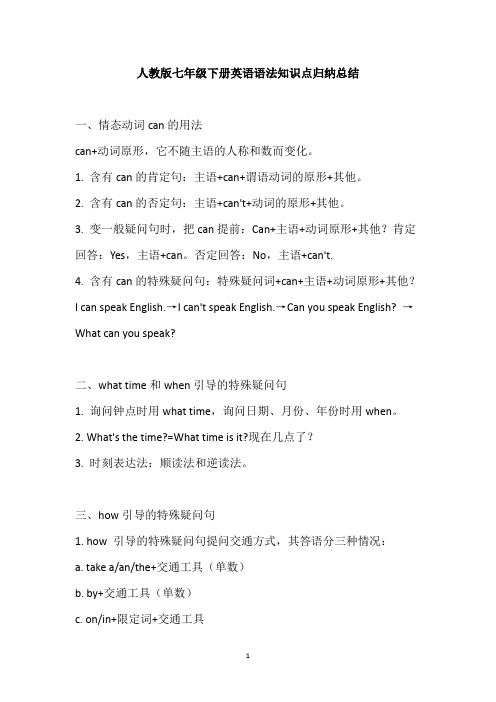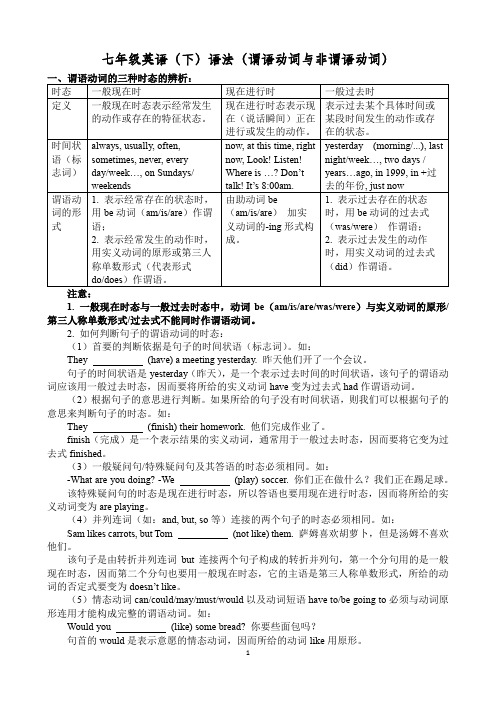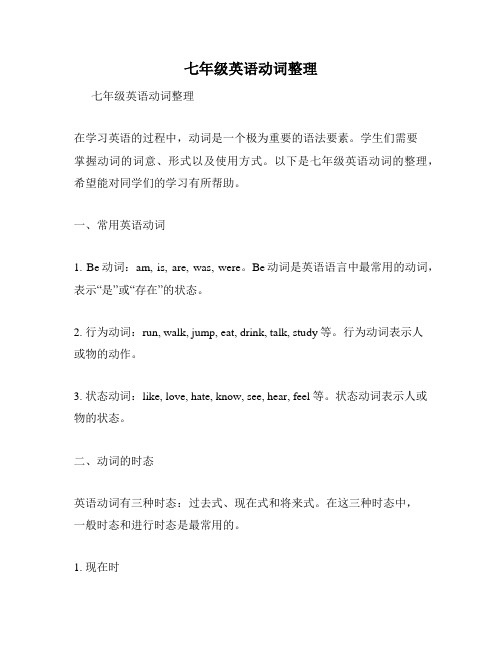七年级下动词用法
人教版七年级下册英语语法知识点归纳总结

人教版七年级下册英语语法知识点归纳总结一、情态动词can的用法can+动词原形,它不随主语的人称和数而变化。
1. 含有can的肯定句:主语+can+谓语动词的原形+其他。
2. 含有can的否定句:主语+can't+动词的原形+其他。
3. 变一般疑问句时,把can提前:Can+主语+动词原形+其他?肯定回答:Yes,主语+can。
否定回答:No,主语+can't.4. 含有can的特殊疑问句:特殊疑问词+can+主语+动词原形+其他?I can speak English.→I can't speak English.→Can you speak English? →What can you speak?二、what time和when引导的特殊疑问句1. 询问钟点时用what time,询问日期、月份、年份时用when。
2. What's the time?=What time is it?现在几点了?3. 时刻表达法:顺读法和逆读法。
三、how引导的特殊疑问句1. how 引导的特殊疑问句提问交通方式,其答语分三种情况:a. take a/an/the+交通工具(单数)b. by+交通工具(单数)c. on/in+限定词+交通工具---How do you go to school every day?---I take a bus to go to school every day./I go to school by bus every day./I go to school on the bus every day.2. how far 用来提问距离,多远,其答语分为两种:(1)用长度单位表示:It is five kilometers.(2)用时间表示:It’s twenty minutes’walk.3. how long 用来提问时间,意为多久回答常用“for+段时”。
2023年人教版七年级下英语动词表

2023年人教版七年级下英语动词表一般动词- be(是,有)- do(做,干)- go(去)- have(有)- say(说)- see(看见)- get(得到,获得)- make(制造,做)- take(拿,带走)- give(给予,给出)- find(找到)- think(思考,认为)- know(知道)- want(想要)- like(喜欢)- love(喜爱,爱)- hate(憎恨,讨厌)- need(需要)- use(使用,利用)- help(帮助)- study(研究)- play(玩耍,玩)- read(阅读,读)- write(写)- listen(听)不规则动词- have(有)- do(做,干)- go(去)- be(是,有)- say(说)- see(看见)- get(得到,获得)- make(制造,做)- take(拿,带走)- give(给予,给出)- find(找到)- think(思考,认为)- know(知道)- want(想要)- like(喜欢)- love(喜爱,爱)- hate(憎恨,讨厌)- need(需要)- use(使用,利用)- help(帮助)- study(研究)- play(玩耍,玩)- read(阅读,读)- write(写)- listen(听)动词短语- give up(放弃)- go on(继续)- take care of(照顾)- look forward to(期待)- get along with(与...相处)- wake up(醒来)- set up(设置)- count on(依靠)- cheer up(振作起来)这个动词表列举了2023年人教版七年级下英语教材中常见的动词,包括一般动词、不规则动词和动词短语。
希望对你的学习有所帮助!。
七年级下册英语第11单元语法。

七年级下册英语第11单元语法七年级下册英语第11单元语法主要包括以下内容:1. 一般现在时- 表示经常性、习惯性的动作或状态,常与时间状语词(如always, often, usually)连用。
- 特殊疑问句和一般疑问句的构成方式。
2. 一般过去时- 表示过去某个时间发生的动作或状态。
- 规则动词的过去式构成。
- 特殊疑问句和一般疑问句的构成方式。
3. 动词的过去式变化- 一般情况下直接加-ed。
- 以不发音的e结尾的动词直接加-d。
- 以辅音字母+y结尾的动词,变y为i,再加-ed。
4. 一般将来时- 表示将来发生的动作或状态。
- 构成方式:will/shall + 动词原形。
5. 一般将来时的特殊疑问句和一般疑问句- 特殊疑问句:特殊疑问词 + will/shall + 主语 + 动词原形。
- 一般疑问句:将will/shall提前到句首。
以上是七年级下册英语第11单元语法的主要内容。
七年级下册英语第11单元语法主要包括以下内容:1. 一般现在时- 表示经常性、习惯性的动作或状态,常与时间状语词(如always, often, usually)连用。
- 特殊疑问句和一般疑问句的构成方式。
2. 一般过去时- 表示过去某个时间发生的动作或状态。
- 规则动词的过去式构成。
- 特殊疑问句和一般疑问句的构成方式。
3. 动词的过去式变化- 一般情况下直接加-ed。
- 以不发音的e结尾的动词直接加-d。
- 以辅音字母+y结尾的动词,变y为i,再加-ed。
4. 一般将来时- 表示将来发生的动作或状态。
- 构成方式:will/shall + 动词原形。
5. 一般将来时的特殊疑问句和一般疑问句- 特殊疑问句:特殊疑问词 + will/shall + 主语 + 动词原形。
- 一般疑问句:将will/shall提前到句首。
以上是七年级下册英语第11单元语法的主要内容。
专题13 重点语法情态动词can的用法(知识点全覆盖)-七年级英语下(人教版)

人教版七年级下学期期中复习查缺补漏冲刺满分(单元重点语法)专题13 重点语法情态动词can的用法一、单项选择1.—Can your parents sing and dance?—________. And they do them very well.A.Yes, they do B.No, they don’t C.No, they can’t D.Yes, they can 2.—Hi! Can you play ping-pong?—________.A.Yes, I am B.No, I can’t C.Yes, I can’t3.—Can he go to Sanya with us?—No, he ________. His father is in hospital.A.can’t B.isn’t C.doesn’t4.You ________ watch TV, but you have to clean the room first.A.must B.can C.can’t5.—May I use your bike, Jack?—Of course you ________. I don’t use it.A.must B.mustn’t C.can D.can’t6.I moved to a new flat and it’s close to my office. Now I ________ walk to work instead of going by car.A.should B.must C.can D.need7.— Wang Hui, you must finish your homework first, or you ______ watch TV.— OK, Mom.A.couldn’t B.needn’t C.can’t8.—Can I take the book out of the reading room?—No, you ________. You ________ read it here. It’s the rule.A.can; must B.don’t have to; mustC.can’t; have to D.mustn’t; can9.—Can I listen to music in class?—________. But you can listen to music in the hallways.A.Yes, you do B.No, you don’t C.Yes, you can D.No, you can’t10.—Look at Sylvia, her performance is really funny.—Yes, she can stand on her head, but she ________ walk on her hands.A.can B.can’t C.like D.don’t like 11.—Can you play chess?—________. I think it’s easy.A.Yes, I do B.No, I don’tC.Yes, I can D.No, I can’t12.Cars, buses and bikes ________ stop when the traffic lights change to red.A.can B.may C.must D.need13.My grandma ________ read or write. She didn’t go to school when she was young. A.can B.must C.can’t14.I need to have my glasses because I ________ see the blackboard.A.must B.mustn’t C.can D.can’t 15.Could you please speak a little louder? I ________ hear you very well.A.can’t B.mustn’t C.should’t D.needn’t 16.— Mom, ________ I play computer games this evening?— Sure, but you ________ finish your homework first.A.can; must B.can; mustn’t C.may; could D.may; can’t 17.— Listen! Is that Linda playing the piano in the room?— No. It ________ be Linda. She is in London these days.A.may not B.needn’t C.can’t D.mustn’t 18.—Can I use your pen, Mr. Smith?—Of course, you ________.A.can B.must C.may D.need 19.— This robot is great.— Wow, it has video cameras in its eyes, so it ________ “see” and interact(交流)with people. A.may B.can C.must D.should20.I ________ ride a bike, but I ________ drive a car.A.can, can B.can’t, can’t C.can, can’t 21.—Must I wash my clothes today?—I’m afraid you ________. You should learn to do something by yourself.A.need B.have to C.can D.could22.— Can you play volleyball every week?— ________. We play it on Wednesdays and Sundays.A.Yes, we do B.No, we don’t C.No, we can’t D.Yes, we can 23.I _______ play tennis but I _______ play table tennis.A.can; can’t B.can; can C.can’t; can’t24.I _______ play tennis but I _______ play table tennis.A.can; can’t B.can; can C.can’t; can’t25.—________ you play _________ basketball?—No, I can’t.A.Do; the B.Can; the C.Can; /D.Are; / 26.—Lisa,________ you speak French?—Yes, but only a little.A.may B.can C.must D.should 27.At the age of five, Jeff ________ play the guitar very well.A.could B.can C.must D.should 28.Tom can’t play basketball on school days, but he ________ play it on weekends. A.must B.can C.have to D.should 29.—Can John swim?— _________. But he can dance.A.Yes, he can B.No, he doesn’t C.Yes, he do D.No, he can’t 30.— Can Linda dance?— ________. But she can sing.A.Yes, she can B.No, she can’t C.Yes, she does D.No, she doesn’t 31.— Can Lily swim?— Yes, she ________.A.is B.can C.do D.does 32.—Jack, _________ you ride a bike?—Yes, I can.A.can B.may C.needn’t D.must 33.—Are the glasses Tim’s?—No, they _________ be his. He doesn’t wear glasses.A.must B.can C.mustn’t D.can’t 34.Why _________ he have a talk with her? _________ he do it tomorrow? A.may; May B.must; May C.can; Must D.can; Need 35.How _________ you be so busy?A.must B.need C.will D.can 36.—_________ you play football with us?—Sorry, I _________. I _________ tidy my room.A.Will; won’t; must B.Could; couldn’t; could C.Can; can’t; have to D.May; may not; must37.—_________ the exam paper be handed in right now?—No, it doesn’t have to. You may hand it in before 11:30.A.Can B.Must C.Should D.May 38.—Where is my umbrella?—It’s fine today. You _________ take an umbrella with you.A.can’t B.needn’t C.mustn’t D.shouldn’t 39.Henry _________ be at home because he telephoned me from Beijing just a moment ago.A.needn’t B.isn’t able to C.can’t D.does 40.—Listen! Is that Kate playing the piano in the room?—No. It _________ be Kate. She has gone to London.A.may not B.needn’t C.mustn’t D.can’t二、用所给单词的正确形式填空41.David can ________ (swim).42.His brother Tim can ________ (dance) very well.43.Listen! He can _________ (speak) much French.44.________(can)you help me out?45.I can't ________ (play) with you. I must do my homework.46.He can ____(play)the guitar on weekends.47.Can Bill ____(write)stories or tell stories?48.I can dance,but I ____(can )sing.49.Can you and Jane____ (join)the art club?50.Can your brother _____(play)the drums?三、完成句子51.–他们会舞龙吗?-不会。
人教版英语七年级下册各单元重要语法内容

一、动词的一般现在时人教版英语七年级下册的重要语法内容之一为动词的一般现在时。
在学习动词的一般现在时时,学生需要掌握动词的三单特殊变化规则,即在第三人称单数时,动词需要在词尾加上-s或-es。
学生还需要学习动词的否定形式和疑问形式的构成方法,以及常见的一般现在时的时间状语如often, usually, always等的用法。
二、名词的单数和复数形式另一个重要的语法内容是名词的单数和复数形式。
学生需要了解名词单数和复数形式的规则,掌握常见的名词复数变化规则,如在词尾加上-s, -es, -ies等。
学生还要熟练掌握一些不规则名词的复数形式,如man-men, woman-women等。
三、形容词的比较级和最高级形容词的比较级和最高级也是七年级下册的重要语法内容之一。
学生需要学习形容词比较级的构成方法以及常见的比较级形式,如比较级+than, more+形容词等。
学生还需要了解形容词最高级的构成方法以及常见的最高级形式,如the+形容词最高级, most+形容词等。
四、介词的基本用法介词是英语中一个重要的语法内容,学生需要掌握介词的基本用法,包括介词表示地点、时间、方向、原因等的用法,以及介词与动词、名词、形容词的搭配。
学生还需要学习一些常用介词的用法,如in, on, under, behind, between等。
五、情态动词情态动词是七年级下册的另一个重要语法内容。
学生需要了解情态动词can, could, may, might, must, shall, should, will, would等的用法和意义,并能正确运用这些情态动词进行句子的构成。
学生还需要学习情态动词的否定形式和疑问形式的构成方法。
六、并列连词和从属连词七年级下册还包括并列连词和从属连词的学习。
学生需要了解并掌握一些常见的并列连词如and, but, or等的用法,以及从属连词如because, when, if, although等的用法。
七年级英语(下)语法《谓语动词与非谓语动词》

七年级英语(下)语法(谓语动词与非谓语动词)1. 一般现在时态与一般过去时态中,动词be(am/is/are/was/were)与实义动词的原形/第三人称单数形式/过去式不能同时作谓语动词。
2. 如何判断句子的谓语动词的时态:(1)首要的判断依据是句子的时间状语(标志词)。
如:They (have) a meeting yesterday. 昨天他们开了一个会议。
句子的时间状语是yesterday(昨天),是一个表示过去时间的时间状语,该句子的谓语动词应该用一般过去时态,因而要将所给的实义动词have变为过去式had作谓语动词。
(2)根据句子的意思进行判断。
如果所给的句子没有时间状语,则我们可以根据句子的意思来判断句子的时态。
如:They (finish) their homework. 他们完成作业了。
finish(完成)是一个表示结果的实义动词,通常用于一般过去时态,因而要将它变为过去式finished。
(3)一般疑问句/特殊疑问句及其答语的时态必须相同。
如:-What are you doing? -We (play) soccer. 你们正在做什么?我们正在踢足球。
该特殊疑问句的时态是现在进行时态,所以答语也要用现在进行时态,因而将所给的实义动词变为are playing。
(4)并列连词(如:and, but, so等)连接的两个句子的时态必须相同。
如:Sam likes carrots, but Tom (not like) them. 萨姆喜欢胡萝卜,但是汤姆不喜欢他们。
该句子是由转折并列连词but连接两个句子构成的转折并列句,第一个分句用的是一般现在时态,因而第二个分句也要用一般现在时态,它的主语是第三人称单数形式,所给的动词的否定式要变为doesn’t like。
(5)情态动词can/could/may/must/would以及动词短语have to/be going to必须与动词原形连用才能构成完整的谓语动词。
人教版七年级下册语法知识点总结

人教版七年级下册语法知识点总结This model paper was revised by the Standardization Office on December 10, 2020人教版七年级下册语法知识点总结第一单元:1.学习情态动词can 表示能力的用法例如:can you swim yes, I can /No ,I can’tWhat can you do2,学习play 的用法Play 与球类,棋牌类等运动项目搭配表示“参加运动”或者“进行比赛”,运动名称前不加“the”进行限定。
Play soccer play cardsPlay 与各种乐器搭配,表示“演奏,弹奏,吹奏”乐器名称前往往会有定冠词“the”进行限定。
Play the trumpet play the er hu第二单元:1.谈论日常活动,正确询问时间。
例如:what time do you usually get upI usually get up at six thirty .2.正确的表达时间1.采用数词表达时间例如:six thirty eight fifteen2.采用past ,to 表达时间一般来说半个小时以内,常常用介词past 表示“几点过几分“例如 half past six半个小时过后多用介词to ,表示“差几分到几点“例如:a quarter to nine第三单元:1.学习谈论怎么样去某些地方例如:how do you get to school2.学习使用how far询问距离,how long 询问时间例如:how long does it take to get to schoolHow far is it from your home to school第四单元:1.学会用祈使句表示规则例如:don’t eat in class2.能够熟练使用can和can’t表示许可例如:can we eat in the classroom No ,we can’t3.熟练掌握have to 的用法。
七年级英语动词整理

七年级英语动词整理七年级英语动词整理在学习英语的过程中,动词是一个极为重要的语法要素。
学生们需要掌握动词的词意、形式以及使用方式。
以下是七年级英语动词的整理,希望能对同学们的学习有所帮助。
一、常用英语动词1. Be动词:am, is, are, was, were。
Be动词是英语语言中最常用的动词,表示“是”或“存在”的状态。
2. 行为动词:run, walk, jump, eat, drink, talk, study等。
行为动词表示人或物的动作。
3. 状态动词:like, love, hate, know, see, hear, feel等。
状态动词表示人或物的状态。
二、动词的时态英语动词有三种时态:过去式、现在式和将来式。
在这三种时态中,一般时态和进行时态是最常用的。
1. 现在时(1)一般现在时:表示经常性的或普通的动作,如:I like to watch TV.(我喜欢看电视。
)(2)进行时:表示正在进行的动作,如:She is reading a book.(她正在读一本书。
)2. 过去时(1)一般过去时:表示过去完成的动作,如:I watched a movie last night.(我昨晚看了一部电影。
)(2)进行时:表示过去正在进行的动作,如:He was playing basketball when I saw him.(当我看到他的时候,他正在打篮球。
)3. 将来时(1)一般将来时:表示将来会发生的事情,如:I will go to the beach next weekend.(下个周末我会去海滩。
)(2)进行时:表示将来会正在进行的事情,如:They will be studying at this time tomorrow.(明天这个时候他们会正在学习。
)三、动词的形式英语动词有原形、过去式、过去分词和现在分词四种形式,同学们需要牢记各个动词的不同形式。
1. 过去式和过去分词:动词加-ed。
- 1、下载文档前请自行甄别文档内容的完整性,平台不提供额外的编辑、内容补充、找答案等附加服务。
- 2、"仅部分预览"的文档,不可在线预览部分如存在完整性等问题,可反馈申请退款(可完整预览的文档不适用该条件!)。
- 3、如文档侵犯您的权益,请联系客服反馈,我们会尽快为您处理(人工客服工作时间:9:00-18:30)。
七年级下动词用法归类1、接doing形式的动词finish mind enjoy practice keep spend2、在固定短语中接doing形式的动词go (shopping / fishing / skating / swimming…)do some (cleaning / washing / reading …)No (talking / smoking / parking)be busy + doing have fun + doingfeel like + doing (想要做某事) can’t help + doing(忍不住做某事) stop sb. from + doing (阻止做某事) thanks (thank you) for + doing be good at / for + doing how / what about + doing3、接to do形式的动词come go want would like decide hope agree tell ask helpa good place + to do It’s time+ to do be surprised + to doIt is + adj. + for sb. +to do sth. have no time + to doThere is no time + to do4、接to do 或doing的动词stop doing/to dostop to do停止,中断做某事后去做另一件事。
stop doing停止做某事。
They stop to smoke a cigarette.他们停下来,抽了根烟。
2 70-A2I must stop smoking.我必须戒烟了。
forget doing/to doforget to do忘记要去做某事。
(未做) forget doing忘记做过某事。
(已做)The light in the office is still on. He forgot to turn it off.办公室的灯还在亮着,它忘记关了。
(没有做关灯的动作)He forgot turning the light off. 他忘记他已经关了灯了。
( 已做过关灯的动作)Don't forget to come tomorrow. 别忘了明天来。
(to come动作未做) remember doing/to doremember to do 记得去做某事(未做)remember doing记得做过某事(已做)Remember to go to the post office after school. 记着放学后去趟邮局。
Don't you remember seeing the man before? 你不记得以前见过那个人吗?be interested doing/to dointerested to do对做某事感兴趣,想了解某事。
interested in doing对某种想法感兴趣,doing 通常为想法。
I shall be interested to know what happens.我很想知道发生了什么事。
(想了解)I'm interested in working in Switzerland. Do you have any idea about that?我对在瑞士工作感兴趣。
你想过这事吗?(一种想法)begin(start) doing/to dobegin / start to do sth begin / start doing sth.1)谈及一项长期活动或开始一种习惯时,使用doing.How old were you when you first started playing the piano?你几岁时开始弹钢琴?2)begin, start用进行时时,后面动词用不定式to doI was beginning to get angry。
我开始生起气来。
3)在begin, start 后接know, understand,这类动词时,常用不定式to do。
I begin to understand the truth。
我开始明白真相。
4)物作主语时It began to melt.go on doing/to dogo on to do做了一件事后,接着做另一件事。
go on doing继续做原来做的事。
After he had finished his math,he went on to do his physics. 做完数学后,他接着去做物理。
Go on doing the other exercise after you have finished this one.作完这个练习后,接着做其他的练习like(love) doing/to dolike(love) doing 一直喜欢做某事,成一种习惯、爱好。
like(love) to do 某一段时间喜欢做某事一般两者可以通用。
感官动词+ doing/to do感官动词see, watch, notice, look at, hear, listen to, smell, taste, find, feel + do表示动作的完整性,真实性;+doing 表示动作的连续性,进行性I saw him work in the garden yesterday.昨天我看见他在花园里干活了。
(强调"我看见了"这个事实)I saw him working in the garden yesterday.(强调"我见他正干活"这个动作)昨天我见他正在花园里干活。
5、接动词原型do的动词let make have to can musthad better (最好) why not = why don’t you6、give / sell / take / show / pass sb. sth. = give / sell / take / show /pass sth. to sb.buy / make / cook / get / draw / sing sb. sth. = buy / make / cook / get / draw / sing sth. for sb.介词“with”的用法A.与,一起,同There is somebody with him. 有人和他在一起。
I usually go to work with my neighbor. 我通常与邻居一起去上班。
B.随身,带有,有……特征Do you take some money with you? 你带钱了吗?Take an umbrella with you. 你带把伞去。
She is a girl with yellow hair and black eyes. 她是一个黄发黑眼的女孩。
C.用……工具,手段,行为的方式Write with a pen. 用钢笔写字。
Work with care. 小心翼翼地工作。
D.用……材料,物质Fill a glass with water. 将杯子装满水。
Pave the street with stone. 用石子铺街道。
E.随着It changes with season. 天气随季节变化。
1.It started to rain. So the children stop _________(play) basketball.2.he likes ______(watch) TV. He _________(watch) TV every day.3.Let’s ______(go) _______(shop). There’s little food in the fridge.4.They want ______(join) the music club. They like _______(sing).5.Thanks for __________(teach) us so well.6.It snowed outside. She had to __________(stay) at home.7.Does he think _____________(fly) kites is for children.8.Can Li Lei ________(play) the guitar well?9._________(play) games made us _______(feel) happy.10.T hey were all tired. So they stopped _________(work).11.L et him _______(stay) in bed. He doesn’t feel well.12.P lease stop _____(watch) TV. Let’s _____(play) computer games.13.P lease remember _________(close) the window when you______(leave) the classroom.14.H e is good at ___________(sing). He wants ______(be) a singer.15.D o you mind my _____________(smoke)?16.T hey would like ________(do) some ________(read) after supper.17.I t’s interesting __________(play) computer games.18.W hat do you think of __________(swim) in the sea?19.M om, let’s __________(go) ____________(shop).20.N obody ________(like) ________(study) all day.21.H e isn’t tired at all. So he stops ____________(work).22.I have something interesting __________(tell) you.23.W ould you like _________(go) to the movie with us.24.H e often practices ____________(speak) English.25.S he would like you ________(help) he ________(learn) science.26.W hat would you like _____________(do)?27.I t was time for Old Henry ____________(go) home.28.W hat about ________(take) a walk after supper?29.J im went __________(fish) yesterday.30.I enjoyed ________(listen) to the music.31.X u Qian loves __________(tell) jokes.32.F oe you, it’s useful to do more _____________(read).33.L ast Sunday, we went to the beach. We had great fun_________(play) in the water.34.H e came here _________(visit) their friends.35.T hanks for __________(ask) me to your party.36.I t’s cold outside. So we decide ___________(stay) at home.37.T hey taught me how ________(cook) Chinese food.38.I have to _________(help) my mother _________(cook) dinner.39.H e found a little boy ___________(cry) in the corner.40.T hey decided __________(go) to the movies.41.D o you mind ______________(sit) here?42.H is mother made him __________(study) all day.43.H e found a wallet __________(lie) on the road.44.T he news made us ________(fell) ___________(excite).45.H e thinks __________(learn) English is for children.46.L ast night, he asked me __________(play) cards with him.47.I t’s time __________(have) breakfast.48.W e went to the park and ___________(fly) kites.49.H e like _____________(eat) noodles. But today he likes_________(eat) dumplings.50.“No _________(talk)!” says the sign.51.H e has lots of work _________(do).52.H e remembered __________(see) you in a middle school.53.Y esterday, he was busy _________(practice) his guitar.54.H e sat on the chair and watched it _________(play) with the cat.55.T he boys always have fun ________(play) basketball after school.辨析:other, another, the other, others的区别[基本含义]one…the other只有两个some…the others有三个以上one…another,another…some…others,others…others = other people/thingsthe others = the rest剩余的全部1) 泛指另一个用another。
